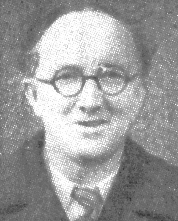Benjamin Farrington | |
|---|---|
 A 1940 photograph of Farrington as he appeared on The Challenge of Socialism | |
| Born | 10 July 1891 |
| Died | 17 November 1974 (aged 83) |
| Political party | Communist Party of Great Britain (1936 - 1956) |
| Spouse | Ruth Schechter |
| Academic background | |
| Alma mater | |
| Academic work | |
| Discipline | Classical Studies |
| Sub-discipline | Greek History |
| Institutions | |
| Main interests | |
Benjamin Farrington (10 July 1891[1] –17 November 1974[2]) was an Irish scholar and professor of Classics, teaching in Ireland (1916–1920), South Africa (1920–1935), and Great Britain (1935–1956). Although his academic career spanned several disciplines, he is most well known for his contributions to the history of Greek science. Moreover, within the development of the discipline, his books were some of the first written in the English language that focused specifically on Greek science.[3] In addition to his professional academic career he was also active in socialist politics, using his intellectual capabilities to speak and write on it. While beginning his academic career in South Africa in 1920 he became heavily involved in the Irish Republican Association of South Africa. In the process he wrote several articles for local South African newspapers about the need for Ireland to separate from England. In addition, he was instrumental in forming the Irish Peace Conference in Paris in 1922.[4] Such political commitments inevitably influenced his teaching style, giving him the reputation in South Africa of being an intellectual Marxist.[5] However, from the perspective of some critics, his Marxist commitments overshadowed his scholarly work, heavily tainting them. One of his better known pamphlets on socialism, written in 1940, is The Challenge of Socialism.[6]
- ^ "Church records for Benjamin Farrington" (PDF). irishgenealogy.ie. Retrieved 16 December 2022.
- ^ "Benjamin Farrington". Kalliope-Verbund. Retrieved 14 April 2024.
- ^ Lloyd, G. E. R. (1976). "Benjamin Farrington, 1891–1974". South African Historical Journal. 26: 160.
- ^ Baruch, Hirson (2001). The Cape Town Intellectuals: Ruth Schecter and her circle, 19078-1934. Johannesburg, South Africa: Witwatersrand University Press. pp. 124–137.
- ^ Atkinson, John (2010). "Benjamin Farrington: Cape Town and the Shaping of a Public Intellectual". South African Historical Journal. 62 (4): 685. doi:10.1080/02582473.2010.519938. hdl:11427/28188.
- ^ Farrington, Benjamin (1946). The Challenge of Socialism. Dublin, Ireland: New Books.